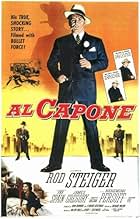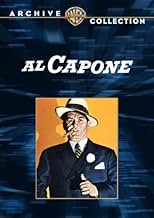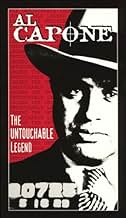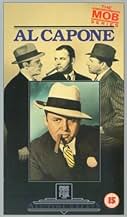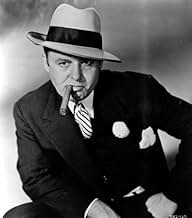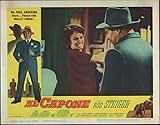IMDb-BEWERTUNG
6,7/10
2067
IHRE BEWERTUNG
Füge eine Handlung in deiner Sprache hinzuA chronicle of the rise and fall of Chicago crime boss Al Capone during the Prohibition era.A chronicle of the rise and fall of Chicago crime boss Al Capone during the Prohibition era.A chronicle of the rise and fall of Chicago crime boss Al Capone during the Prohibition era.
- Regie
- Drehbuch
- Hauptbesetzung
- Auszeichnungen
- 1 Gewinn & 1 Nominierung insgesamt
Raikin Ben-Ari
- Ben Hoffman
- (as Ben Ari)
Fred Aldrich
- Funeral Spectator
- (Nicht genannt)
Cindy Ames
- Nurse
- (Nicht genannt)
Empfohlene Bewertungen
This 1959 picture is yet another cinematic retelling of the life of mobster Al Capone, and is better than most I've seen. Rod Steiger as Big Al seems miscast at first but wins me over in the end. Steiger was a born ham, but a fine actor for all his Methodish mannerisms, and has moments in the movie in which he's almost hypnotically effective. Yes, it's a performance, I kept on telling myself, but so was Capone himself. Over the top, perhaps, but Capone was himself more than a little touched, and Steiger nails this aspect of Capone to perfection, and is more effective in capturing the big guy's capriciousness than Robinson or Muni before him. Steiger's Capone isn't merely a gangster, he's a man possessed.
Director Richard Wilson's keeps this fairly modestly budgeted film moving at a fast pace, and it's never boring. In supporting roles, Fay Spain, Martin Balasm, James Gregory and Nehemiah Persoff are all effective. The black and white of this film evokes the late fifties more than the roaring twenties, and the movie at times feels a little like an episode of The Untouchables, at other times like Some Like It Hot. The Jazz Age was itself hot as the Eisenhower era was drawing to a close. F. Scott Fitzgerald's novels were coming back into vogue. O'Neill revivals on and off-Broadway were becoming commonplace. Al Capone captures this nostalgic mood, but really makes me nostalgic for the fifties more than for the twenties, for a time when fairly recent history could still be viewed as larger than life, the stuff of serious art and contemplation, not just fashionable nostalgia. Al Capone the movie is more nostalgia than serious art, but it touches on important issues, concerning violence, friendship, the role of government and the press as they pertain to and often collude with the criminal element, that still resonate today.
Director Richard Wilson's keeps this fairly modestly budgeted film moving at a fast pace, and it's never boring. In supporting roles, Fay Spain, Martin Balasm, James Gregory and Nehemiah Persoff are all effective. The black and white of this film evokes the late fifties more than the roaring twenties, and the movie at times feels a little like an episode of The Untouchables, at other times like Some Like It Hot. The Jazz Age was itself hot as the Eisenhower era was drawing to a close. F. Scott Fitzgerald's novels were coming back into vogue. O'Neill revivals on and off-Broadway were becoming commonplace. Al Capone captures this nostalgic mood, but really makes me nostalgic for the fifties more than for the twenties, for a time when fairly recent history could still be viewed as larger than life, the stuff of serious art and contemplation, not just fashionable nostalgia. Al Capone the movie is more nostalgia than serious art, but it touches on important issues, concerning violence, friendship, the role of government and the press as they pertain to and often collude with the criminal element, that still resonate today.
Rod Steiger is excellent as the famed Italian-American gangster Al Capone. When you see him speaking Italian and getting hurt feelings when someone disrespects him, it makes you wonder (if you haven't already) why Marlon Brando was cast as the titular role in The Godfather, when so many other actors would have done a better job. Rod is so great in this role, it dampens others who have subsequently played Capone. Why was it necessary to keep making biopics when Scarface (the original) and Al Capone were so well-acted?
In the supporting cast, you'll see Martin Balsam, James Gregory, and Nehemiah Persoff. There's a pretty big focus on Capone's Achille's heel: Fay Spain. He's an enormously powerful man who gets his way always, and yet he's completely vulnerable to Fay's affections. He brings her expensive presents and dresses her well, but when she still doesn't love him, he feels worthless and unappreciated. I didn't understand why he didn't just move on and get another mistress, but then again, people are often drawn to those who will hurt them.
If you like Rod Steiger, check out this lesser known drama. It's filmed in a very old, 1930s style to pay tribute to the gangster period. It probably wasn't a hit at the time because movies like Ben-Hur, Journey to the Center of the Earth, and North by Northwest were big spectacles in Technicolor and full of action. This is a black-and-white nostalgia piece that reminds viewers of Prohibition and the Great Depression. It's well-done, but it's definitely stylized.
In the supporting cast, you'll see Martin Balsam, James Gregory, and Nehemiah Persoff. There's a pretty big focus on Capone's Achille's heel: Fay Spain. He's an enormously powerful man who gets his way always, and yet he's completely vulnerable to Fay's affections. He brings her expensive presents and dresses her well, but when she still doesn't love him, he feels worthless and unappreciated. I didn't understand why he didn't just move on and get another mistress, but then again, people are often drawn to those who will hurt them.
If you like Rod Steiger, check out this lesser known drama. It's filmed in a very old, 1930s style to pay tribute to the gangster period. It probably wasn't a hit at the time because movies like Ben-Hur, Journey to the Center of the Earth, and North by Northwest were big spectacles in Technicolor and full of action. This is a black-and-white nostalgia piece that reminds viewers of Prohibition and the Great Depression. It's well-done, but it's definitely stylized.
Chicago in the 1920's: rife with political and police corruption and increasingly run by mobsters. The most famous of them undoubtedly was Al Capone. In this bio-pic, Capone is played very effectively by Rod Steiger. Steiger captured both the role and the man. Capone was a guy of humble origins, but was a bit of a contradiction: he had no education but a love for culture; he was a ruthless gangster but for the most part stayed legally "clean." Steiger captured both the ruthlessness and the culture with his portrayal. Based on actual photographs of Capone that I've seen, Steiger even looked the part. He was very impressive.
The movie basically traces Capone's career in crime from the time he arrives in Chicago in 1919 as a bodyguard to a local crime figure and takes it up to his conviction for income tax evasion of all things (it was the only crime they could ever actually pin on him) in 1931, with a very brief look at Capone in Alcatraz, and a voice-over explaining his last years before his death in 1947. Watching his rise was always interesting. A lot of this is fictional. James Gregory's character (the honest Chicago cop who commits himself and his entire career to bringing Capone down, and from whose perspective the story is told) didn't exist, and there's no portrayal of Capone's actual marriage; instead the movie focuses on a relationship he supposedly develops with a woman (Fay Spain) whose husband he had killed in the early part of his criminal career. The character of the newspaperman Keely (Martin Balsam) was based on a real figure, although the name was changed.
By the standards of the modern era of film-making, this is laughably clean. There are a lot of shootouts, but no blood ever appears on those who are shot and killed, and in general these gangsters are awfully polite! There's an extended look on the planning of the St. Valentine's Day Massacre (as Capone used his men to take out many of his rivals in Chicago while he stayed at his home in Florida) although the Massacre itself doesn't take very long and - again - isn't especially graphic.
This represents an interesting and believable (if not quite historically accurate) look at not only Capone but at the state of Chicago in the era and of the role that Prohibition played in promoting the rise of organized crime, and Steiger's performance alone makes this worth watching. (8/10)
The movie basically traces Capone's career in crime from the time he arrives in Chicago in 1919 as a bodyguard to a local crime figure and takes it up to his conviction for income tax evasion of all things (it was the only crime they could ever actually pin on him) in 1931, with a very brief look at Capone in Alcatraz, and a voice-over explaining his last years before his death in 1947. Watching his rise was always interesting. A lot of this is fictional. James Gregory's character (the honest Chicago cop who commits himself and his entire career to bringing Capone down, and from whose perspective the story is told) didn't exist, and there's no portrayal of Capone's actual marriage; instead the movie focuses on a relationship he supposedly develops with a woman (Fay Spain) whose husband he had killed in the early part of his criminal career. The character of the newspaperman Keely (Martin Balsam) was based on a real figure, although the name was changed.
By the standards of the modern era of film-making, this is laughably clean. There are a lot of shootouts, but no blood ever appears on those who are shot and killed, and in general these gangsters are awfully polite! There's an extended look on the planning of the St. Valentine's Day Massacre (as Capone used his men to take out many of his rivals in Chicago while he stayed at his home in Florida) although the Massacre itself doesn't take very long and - again - isn't especially graphic.
This represents an interesting and believable (if not quite historically accurate) look at not only Capone but at the state of Chicago in the era and of the role that Prohibition played in promoting the rise of organized crime, and Steiger's performance alone makes this worth watching. (8/10)
I loved this black and white movie. It stared Rod Steiger who comes across like Mr. Tony Soprano actually. It was told in the tradition of a biography. Capone was so violent yet a great businessman. This movie is borderline FILM NOIR. Mr. Capone, in the movie, starts out as a simple bouncer and them works his way up to the bossman of the Chicago Syndicate. He eventually was convicted on INCOME TAX evasion and sentenced to 11 years at THE ROCK. The movie even takes us into THE ROCK where it shows Capone and how he loses his power. What makes this movie really great is simply ROD's portrayal of Scarface. He plays it very very well. If I had to choose ANY GANGSTER movie from that subject matter, this is it.
It's 1919 Chicago. Al Capone (Rod Steiger) is new in town. Nationwide Prohibition begins in 1920. The violent thug rises to be a top gangster.
This is a brutal depiction of the crime figure. It does have his prominent face scar. I don't always remember it being that prominent although the man is nicknamed Scarface. Overall, the performance has a realistic brutality. It's a rather straight forward biopic. I'm not sure how much new is being done here. Rod Steiger seems to have a dash of Brando but he's not at that level of charisma. The power is present. Others have done it bigger. Nevertheless, it's a very worthy performance.
This is a brutal depiction of the crime figure. It does have his prominent face scar. I don't always remember it being that prominent although the man is nicknamed Scarface. Overall, the performance has a realistic brutality. It's a rather straight forward biopic. I'm not sure how much new is being done here. Rod Steiger seems to have a dash of Brando but he's not at that level of charisma. The power is present. Others have done it bigger. Nevertheless, it's a very worthy performance.
Wusstest du schon
- WissenswertesMartin Balsam's character, Mac Keeley, was based on a real-life Chicago Tribune reporter named Jake Lingle. Lingle, a "legman" who ran down gang-related stories for the paper, had close ties to Al Capone and other gangsters as well as the notoriously corrupt Chicago Police Department, and he was well-paid by both mobsters and a police commissioner as a "go-between." Lingle was gunned down on June 9, 1930, much as depicted in the movie, after "getting too big for his hat", as Capone put it, and demanding too much for his services (though a Capone rival likely paid for the hit). Apparently legal concerns prevented the producers of this film from using Lingle's name. However, just a few months after this film was released, the TV series Die Unbestechlichen (1959) told Lingle's story in its third episode and used his actual name.
- PatzerAl Capones had two scars on his left cheek according to actual (if rare - Capone disliked being photographed to show them as is correctly pointed out in the film) photos. The depiction in films like Chicago-Massaker (1967) and Capone (1975) is closer to the truth.
- Zitate
Al Capone: Nobody leaves Al Capone, you understand that?
Maureen Flannery: Well I do!
Al Capone: Oh no, you don't!
Maureen Flannery: Would you do me a favor please? Would you kill me?
- VerbindungenEdited into The Mystery of Al Capone's Vaults (1986)
Top-Auswahl
Melde dich zum Bewerten an und greife auf die Watchlist für personalisierte Empfehlungen zu.
- How long is Al Capone?Powered by Alexa
Details
- Erscheinungsdatum
- Herkunftsland
- Sprache
- Auch bekannt als
- Al Capone - Der größte Gangster aller Zeiten
- Drehorte
- Produktionsfirma
- Weitere beteiligte Unternehmen bei IMDbPro anzeigen
Box Office
- Budget
- 550.000 $ (geschätzt)
- Laufzeit1 Stunde 44 Minuten
- Farbe
- Seitenverhältnis
- 1.85 : 1
Zu dieser Seite beitragen
Bearbeitung vorschlagen oder fehlenden Inhalt hinzufügen



